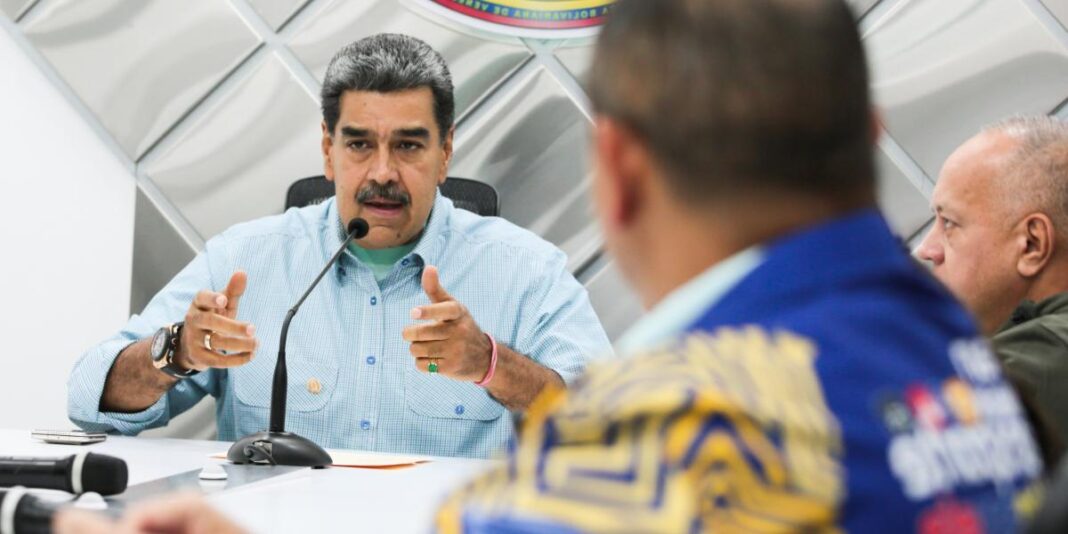BTN News: Venezuela is escalating its political crisis with the international community following the arrest of several foreign nationals accused of involvement in an assassination plot against President Nicolás Maduro and Vice President Delcy Rodríguez. The move has sparked a diplomatic backlash from both the U.S. and Spain, as tensions continue to rise over allegations of “terrorist plans” and foreign intervention.
Dramatic Arrests Ignite Diplomatic Tensions
In a dramatic announcement over the weekend, Venezuelan Interior Minister Diosdado Cabello declared the seizure of 400 rifles and the detention of two Spanish citizens, three Americans, and one Czech national. Cabello claimed they were involved in a plot to “assassinate” President Maduro and Vice President Rodríguez, further alleging that “mercenaries from France and Eastern Europe” had been hired to attack Venezuela.
The claims, made public on Saturday, prompted immediate denials from both Spain and the United States. On Sunday, a spokesperson for the U.S. State Department firmly rejected any involvement, labeling the allegations as “categorically false” and reiterating the U.S. stance in favor of a democratic solution to Venezuela’s ongoing crisis.
Spain and the U.S. Respond to Accusations
Madrid swiftly rebuffed Venezuela’s claims that the detained Spanish nationals, José María Basoa Valdovinos and Andrés Martínez Adasme, had links to Spain’s intelligence agency, the CNI, or to the Venezuelan opposition. Family members of both men, who were reported missing in early September, insist they were merely tourists. The Spanish government has strongly condemned the detentions and has demanded their immediate release.
Meanwhile, the U.S. government confirmed that three of its citizens are currently held in Venezuela. Among them is a soldier detained in Caracas on August 30th, accused of orchestrating a CIA-led plot to overthrow Maduro, alongside two other American citizens, Estrella David and Aaron Barren Logan. U.S. officials have been working to verify their status and are pushing for consular access.
Historical Context: A Pattern of Political Bargaining
Venezuela’s latest arrests are not without precedent. The Maduro government has previously detained foreign nationals, often using them as leverage in negotiations with the international community. In 2020, two American ex-soldiers, Airan Berry and Luke Denman, were captured and accused of plotting against Maduro. Their eventual release followed a prisoner swap involving a close associate of President Maduro, Alex Saab.
A similar exchange occurred in October 2022 when Washington released two relatives of Cilia Flores, Venezuela’s first lady, imprisoned on drug trafficking charges. In return, Venezuela released seven Americans, including five executives from the oil company Citgo. These instances highlight a recurring pattern where high-profile detainees become bargaining chips in the geopolitical game.
Spain-Venezuela Relations Hit New Low
This latest episode comes amid a backdrop of heightened diplomatic strain between Spain and Venezuela. Relations soured after Spain offered asylum to Edmundo González, a prominent Venezuelan opposition figure. The Spanish Congress recently recognized González as the rightful president following disputed elections in Venezuela in July. In response, Caracas accused Spain of meddling in its internal affairs, a charge that has intensified with the recent detentions.
Josep Borrell, the European Union’s top foreign affairs representative, has added to the controversy by calling the Venezuelan government a “dictatorial and authoritarian regime” in a recent interview. The Venezuelan government swiftly retaliated, branding Borrell a “spokesperson of evil,” escalating verbal hostilities further.
What’s Next in Venezuela’s Diplomatic Saga?
Venezuela’s decision to arrest foreign nationals amid existing tensions with major global players is seen by some analysts as an attempt to gain leverage in ongoing political negotiations. The incident raises concerns about the safety of foreign nationals in Venezuela and underscores the Maduro regime’s confrontational stance toward its critics abroad.
As international scrutiny grows, the EU and the U.S. may consider further measures in response to the escalating situation. For now, families of the detained wait anxiously, as governments on both sides navigate a delicate and increasingly fraught diplomatic landscape.
Key Developments to Watch
- U.S. and Spain Reactions: Both countries have demanded immediate clarification and the release of their citizens.
- EU’s Position: Possible future sanctions or diplomatic moves in response to Venezuela’s actions.
- Humanitarian Concerns: Increasing worry over the treatment of detainees and potential rights violations.
Conclusion: A Volatile Moment in International Relations
The arrest of foreign nationals by the Venezuelan government represents another chapter in its ongoing confrontation with the international community. With diplomatic relations hanging by a thread, the developments in Caracas could have far-reaching implications for regional stability and international diplomacy.


